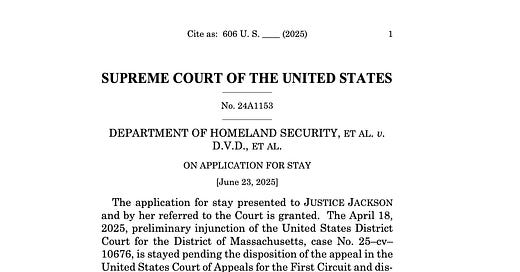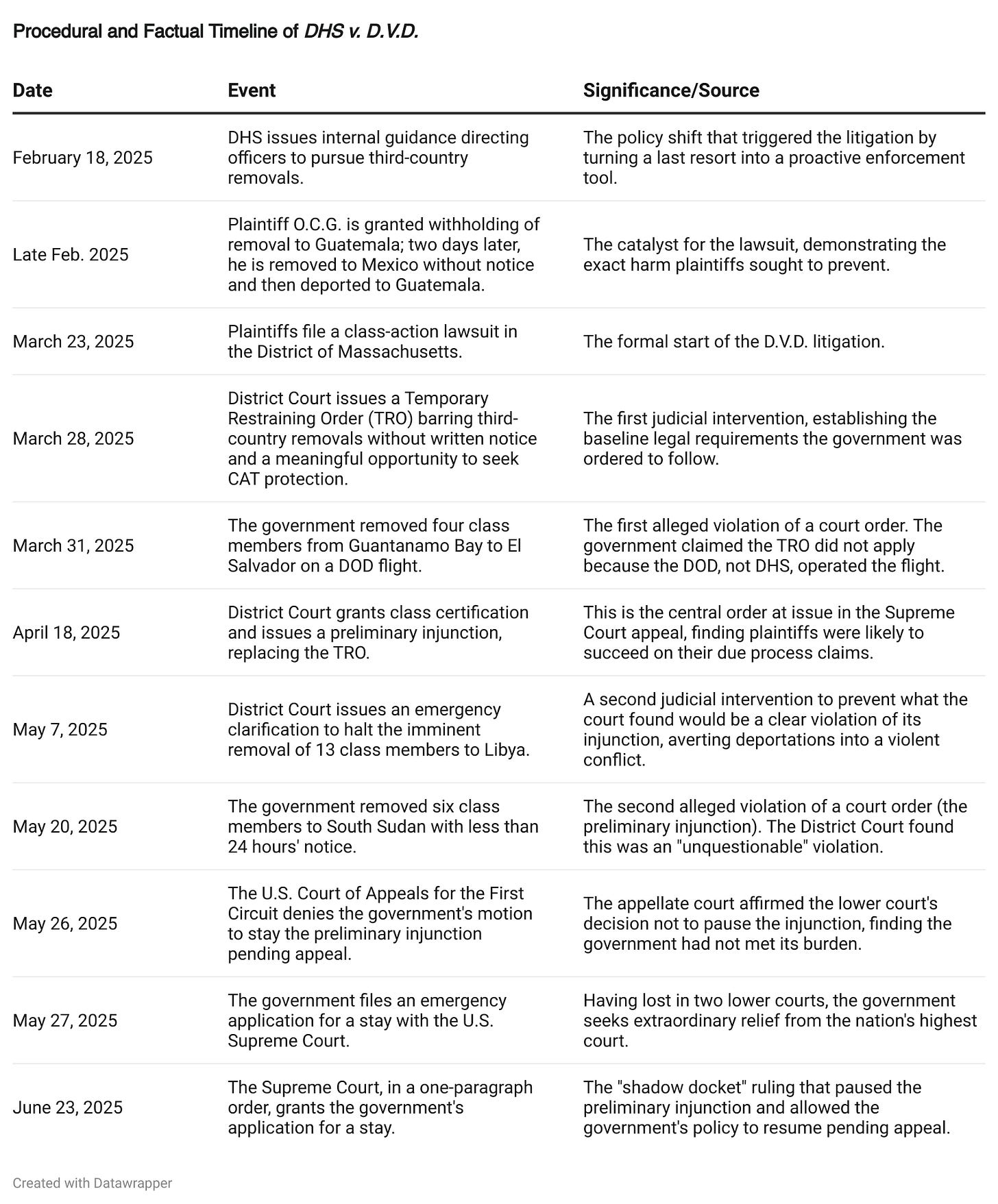The Rule of Law or the Rule of Vibes?
This is no longer a slippery slope; we are in the midst of the fall.
My fear is that we are governed not by established law, but by the shifting 'vibes' of an administration, was given confirmation by a recent Supreme Court order.
A recent dissenting opinion from the Supreme Court in Department of Homeland Security v. D.V.D. throws this anxiety into sharp view. In the case, the Supreme Court, through an unsigned "shadow docket" order, granted the government's request to stay a lower court injunction. That injunction had halted a government policy that pitted executive power against fundamental rights. It temporarily stopped the removal of noncitizens to 'third countries' often without notice, process, or the chance to seek protection from torture guaranteed by U.S. and international law.
Justice Sotomayor’s dissent details a case that seems to confirm my fears.
As she writes:
"In matters of life and death, it is best to proceed with caution. In this case, the Government took the opposite approach."
The dissent recounts how the government repeatedly defied direct court orders. Here, the concern about the administration's actions appearing to "overturn law or precedence" is manifest. The established legal framework requiring notice, hearings, and adherence to court injunctions was not just ignored, but openly flouted.
The case was sparked by the removal of a Guatemalan man, “O.C.G.,” who had previously been granted withholding of removal to Guatemala by an immigration judge after he fled the country due to torture for his identity as a gay man. Two days later, without notice, he was taken from his cell, put on a bus to Mexico, and then promptly deported back to Guatemala, the very country where he feared for his life. The government later admitted to providing false information in court regarding his removal.
Following this, a District Court issued a Temporary Restraining Order (TRO) to prevent such removals without notice and a meaningful opportunity to seek protection. What followed was a pattern of escalating defiance, as the government repeatedly ignored the court's authority:
Justice Sotomayor argued that by granting the government a stay, the Supreme Court was rewarding this "flagrantly unlawful conduct." She wrote:
"Here, in violation of an unambiguous Temporary Restraining Order (TRO), the Government flew four noncitizens to Guantanamo Bay, and from there deported them to El Salvador. Then, in violation of the very preliminary injunction from which it now seeks relief, the Government removed six class members to South Sudan with less than 16 hours' notice and no opportunity to be heard."
She concludes that the Court's decision to grant relief "further erodes respect for courts and for the rule of law."
When the government can deport individuals to a war-torn nation in direct violation of a court order, the very concept of a nation of laws is threatened. The government's justification, as described in the dissent, often fell back on its own authority, effectively arguing that its operational needs superseded the clear letter of the law and the judiciary's role in checking that power.
This suggests that the "legality" of an action is no longer determined by statutes or judicial review, but by the will of the executive branch. The foundation of our legal system is not merely being questioned; with each 'emergency' action rubber-stamped by the judiciary, it is being actively dismantled. As Justice Sotomayor concluded in her dissent:
"By rewarding lawlessness, the Court once again undermines that foundational principle."
For me, as a naturalized citizen, this is more than a legal abstraction.
I chose this country. I studied its history, I swore an oath to its Constitution, I accepted citizenship as a promise, a promise of stability, of rights, of belonging to a nation governed by laws, not whims.
When I see the government disregard those laws and courts seemingly enable it, that promise feels fragile. The same logic that justifies ignoring court orders for one group can be used to erode the rights of another. It creates an uncertainty where the ground beneath your feet is no longer solid.
Today I am a citizen, but who knows what I will be tomorrow, as the vibe shifts and the rules are rewritten on a whim.






